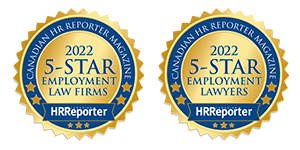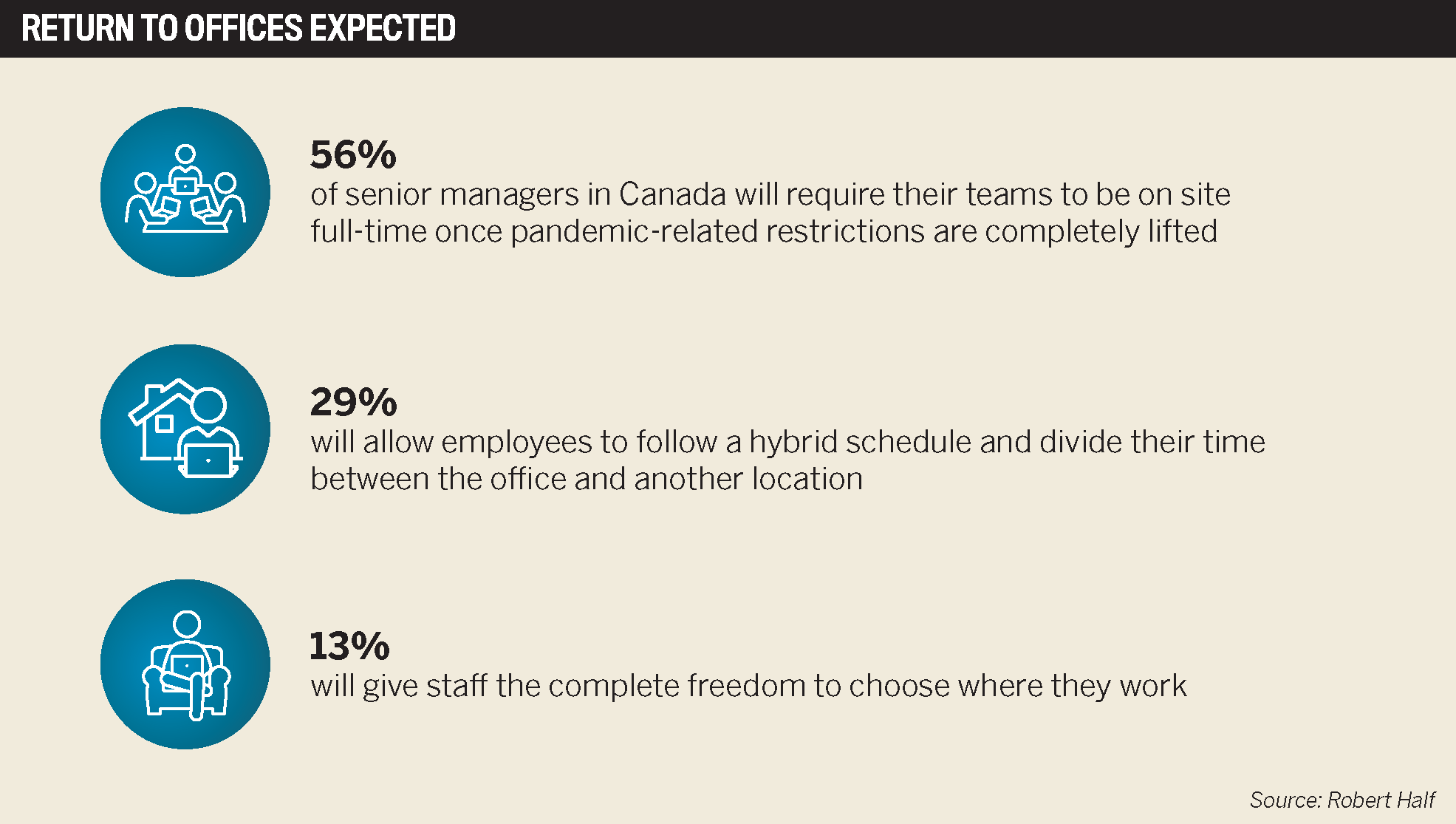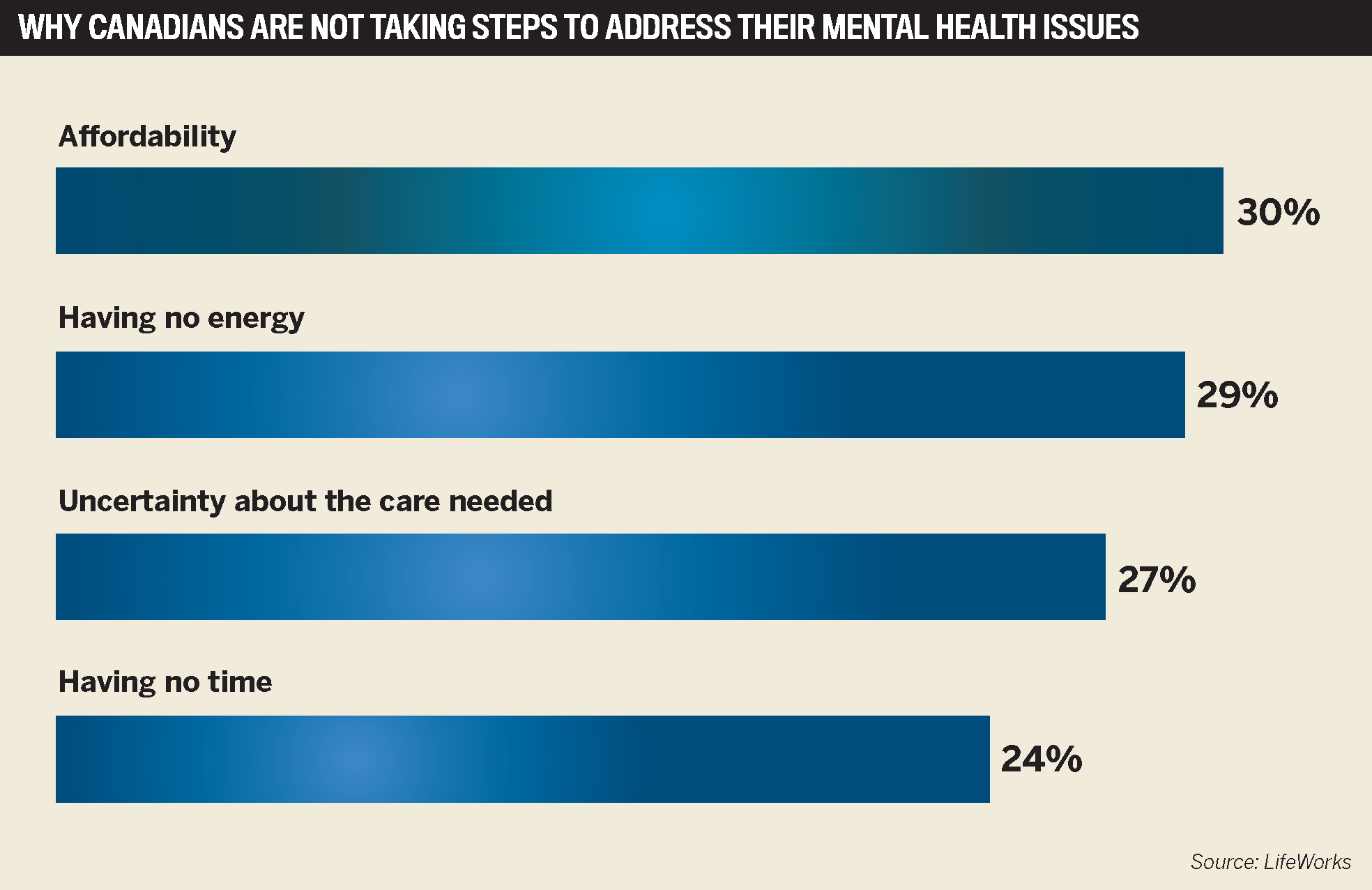

Jump to winners | Jump to methodology
“My desk has been imploding over the last two years,” says Sandra Guarascio, partner at Roper Greyell in Vancouver and one of this year’s 5-Star Employment Lawyers, referring to the unprecedented impact of COVID-19 on her profession.
“It’s clear that the pandemic has infused a lot of uncertainty and unpredictability into workplaces. And it has also increased baseline personal and professional stress across the board. So, how does that then play out in employment law?”
This question is the main concern in employment law at present, and Canadian HR Reporter’s conversations with three top lawyers reveal the specific issues that deserve attention. These include vaccine and mask mandates, the rise of remote work and hybrid setups, and mental health challenges.
“You allow your workforce to go home and work remotely, and when you ask them back, that’s a fundamental change in the terms and conditions of their employment”
Sandra Guarascio, Roper Greyell
Public health recommendations on masks and vaccines have prompted many employers to carry out mandates for employees. But this move has led to a “massive uptick in complaints” related to the various workplace requirements, says Guarascio.
“That’s years of litigation in the pipeline, not including the complaints that are still going to come.”
While federal and provincial governments have made vaccine mandates for public servants a lawful requirement, the same is not true for other employers who then “face a lot of uncertainty and risk,” Guaracio says.
“They’re aligned with public health directives by implementing mandates, but they don’t have the safety net of legislation. So, there’s going to just be a lot of litigation.”
Following from that, employees who haven’t been fully vaccinated will either be put on unpaid leaves or be terminated, she says. Guarascio expects to see a huge growth in the number of wrongful or constructive dismissal claims as a result of such company decisions.
Alexandre Buswell, partner at McCarthy Tétrault in Montreal and another 5-Star Employment Lawyer, says it’s interesting to see where things actually land. He says that the current situation is strange because there’s still no indication from a court, arbitration tribunal, or superior court, in Quebec or elsewhere in Canada, as to whether vaccine mandates are valid or not. For the time being, many employers’ decisions are a shot in the dark.
“The first few decisions that have come out pertain to the validity of policy provisions and identity of policies themselves. But there’s no strong sense of what the courts and tribunals will actually end up saying, in as far as the possibility of terminating an employee who refuses to get vaccinated,” Buswell says.
The situation has been frustrating for many employers because the government keeps sending out suggestions and recommendations, but doesn’t legislate around the issue, says Jamie Knight, partner at Filion Wakely Thorup Angeletti in Toronto.
“It’s good for us lawyers, but the result is that each client then has to consider what their policy is, and if they’re in a unionized workplace, they’re then susceptible to both policy grievances and individual grievances for employees who don’t comply,” he says.
“There’s no consistent approach across the board. And there are consequential issues that arise. Even in a non-union workplace, of course, we end up with the potential for wrongful dismissal cases or constructive dismissal cases if an employer determines that an employee is not vaccinated and won’t be allowed to work.”
Most commonly, people are raising religious or political objections to the vaccine mandates, says Guarascio. She believes that less litigation would result from such mandates if there would be clear and enforceable laws, which would provide guidance to employers and the public.
“There’s no strong sense of what the courts and tribunals will actually end up saying [about] the possibility of terminating an employee who refuses to get vaccinated”
Alexandre Buswell, McCarthy Tétrault
During the pandemic, organizations have become accustomed to hybrid work setups, enabling staff to work both at home and in the office. Not surprisingly, many employees have embraced the plus sides of remote work, such as increased flexibility, more time with families and a lack of commuting. Now, employers are rethinking their brick-and-mortar footprint, which is obviously a costly operational expense, and looking at adopting more permanent hybrid work relationships, says Guarascio.
“And then some are calling employees back into the workplace and finding the employees reluctant to return,” she says.
“This means changes in expectations, in terms of employment, and a lot of movement that can obviously translate into litigation, and a need for more careful planning around policies and employment terms to preserve flexibility in the management of the employment relationships.”
She says that employers should handle the situation cautiously, and make sure their employment agreements are flexible enough.

“One of the things that can happen is you allow your workforce to go home and work remotely, and then when you ask them back – that’s a fundamental change in the terms and conditions of their employment. And people will say, ‘Sorry, not coming back.’ And if that happens and you’re trying to enforce it, you could end up in a constructive dismissal [case] because you’ve changed the game rules for them,” she says.
Unless the employment agreement actually considers the discretion to flow in and out of hybrid work relationships, employers face risk by permitting such changes. Therefore, a lot of employers are starting to implement detailed policies to deal with remote work, Guarascio explains.
Meanwhile, Buswell believes that offering the option to work remotely is increasingly important for employers when it comes to issues such as recruitment and retention.
“So employers are going to have to be cautious about the policy that is in place at the time of hiring, and the policies that they intend to change or put forward… including the relevant provisions in the employment agreement such that if they want to force employees to come back to the work premises on a full-time basis, they need to have the proper foundation in a policy or in a contract of employment.”
“The medical community and the legal community may have to start working together to come up with a better understanding of what is actually a disabling psychiatric condition”
Jamie Knight, Filion Wakely Thorup Angeletti
The pandemic brings increased stress in people’s lives, and that plays out in workplaces, says Guarascio.
“More stress equals more conflict… And there’s no doubt that we see more and more of these frictions playing out and complaints surfacing around bullying and harassment in the workplace.”
However, remote working arrangements are less likely to create situations of psychological harassment, though they’re still possible through email or a Teams call, says Buswell.
“The reality is we’ve seen a decline in terms of the number of cases involving allegations of sexual harassment and bullying in a workplace because people, basically, have fewer social interactions in the workplace, even when they are physically present,” he says. This remains an important topic of discussion and it’s interesting to see what happens as people start returning to the workplace.
Mental health in the workplace has become a huge issue, especially when it plays out in the courts, says Knight. One case, for example, involved a verbal altercation between two employees. While the psychiatrist testified that there was no underlying history of mental illness and the incident wasn’t sufficient to cause post-traumatic stress, they also said that one of the employees had such a strong reaction to this altercation that he would never be able to return to the workplace.
Knight considers this “a ridiculous position” and yet, many members of the medical community simply advocate for their patients. Life-altering evaluations are made although there’s no investigation of the objective evidence, he says.
“I think the medical community and the legal community may have to start working together to come up with a better understanding of what is actually a disabling psychiatric condition, as opposed to a normal mental health reaction.”
The importance of such an insight is emphasized as organizations seek legislative clarity to guide policy implementation in various types of workplaces. Under the circumstances, many of the employment lawyers and law firms surveyed for this report expect more demanding days ahead.

To determine the best lawyers and law firms catering to the employment industry, Canadian HR Reporter sourced feedback from HR leaders over a period of 15 weeks. The research team began by conducting a survey with a wide range of HR leaders to determine what they value in the law firms they collaborate with. The in-depth information gleaned from this survey enabled the research team to assign weighted values to the services offered by law firms to their employment clients.
The research team also spoke to hundreds of employment professionals across the country by phone, asking them to rate the employment law firms and lawyers they had worked with over the previous 12 months. In addition, the team sought the opinions of employment lawyers themselves to find out which law firms they would recommend besides their own.
At the end of the research period, the law firms and lawyers that received the highest rankings in work quality, specialist expertise and client service were declared 5-Star Award winners in the field of employment law.
69% of survey respondents think their work in employment law will increase in the next year
24% of respondents think their work will stay the same in the next year
7% of respondents think their work will decrease in the next year